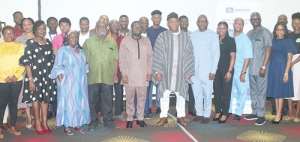
A seasoned communications scholar and consultant, Professor Kwame Karikari, has urged Ghana’s political leaders to demonstrate commitment by passing a modern Broadcasting Law that aligns with today’s technological environment and safeguards the public interest.
Despite the media sector’s massive transformation—from a single state-owned broadcaster to nearly 600 radio stations—successive governments have consistently failed to prioritise the legislation, Prof. Karikari said.
Speaking during a consultative meeting on the long-stalled Broadcasting Bill in Accra, he linked the legislative delay to political apprehensions over media regulation in a democratic setting. Politicians, he noted, often hesitate to act decisively for fear of being seen as interfering with media freedom, a cornerstone of public accountability and democratic engagement.
The meeting, convened by UNESCO Ghana, brought together a cross-section of stakeholders, including officials from the National Communications Authority (NCA), National Media Commission (NMC), Ghana Independent Broadcasters Association (GIBA), Ghana Journalists Association (GJA), and experts in law and academia. Together, they reviewed the bill’s content and debated its potential implications for the country’s broadcasting landscape.
“The point I’m driving at is that the whole idea of a Broadcasting Law in this country does not seem to be a priority for any of the governments, which also indicates that when it comes to media policy, media regulation issues, it’s very political,” Prof. Karikari stated.
“Now, whatever it is, whatever happens to the bill, in my view, because it has travelled so long, and because technology has changed so drastically, almost a 360-degree development of the technology, it will require some very sensitive and very committed revisits of that bill so that it conforms to today’s realities of the technology,” he added.
Prof. Karikari, who once chaired the board of Graphic Communications Ltd, also voiced concern about the lack of legal and regulatory safeguards for community broadcasting. He cited cases where station owners exploited regulatory loopholes by claiming community status while operating commercially and emphasised the need for clearer definitions and enforcement mechanisms.
While acknowledging recent efforts to revise the bill, he maintained that structural issues—especially those affecting the sustainability of community stations—remained unresolved. Without genuine political will, he warned, broadcasting standards, ethics, and public benefits would continue to erode.
From a development perspective, Edmond Moukala, Country Representative and Head of the UNESCO Office in Accra, highlighted the broader value of empowering community media in advancing national progress.
He stressed the importance of inclusive broadcasting in nurturing democratic participation, celebrating linguistic and cultural diversity, and amplifying marginalised voices.
“As Ghana continues to advance its democratic and socio-economic development, the role of the media cannot be overstated. Broadcasting presents a historic opportunity to strengthen and regulate the media landscape, particularly by recognising and empowering community forecasting,” said Mr Moukala.
Adding a legal dimension to the discussion, lawyer and media rights advocate Samson Lardy Anyenini drew attention to the mismatch between Ghana’s outdated media laws and the fast-evolving digital media terrain.
He noted that overlapping roles and jurisdictional disputes between regulatory bodies like the NMC and NCA had created confusion and regulatory gaps. While the NMC sought broader authority, the NCA remained cautious—despite both being essential to overseeing the media space under legislation enacted in 2008.
Mr Anyenini warned that without urgent reform and institutional coordination, media freedoms—particularly for vulnerable outlets such as community radio—would remain at risk in an increasingly fragmented and fast-paced information environment.


